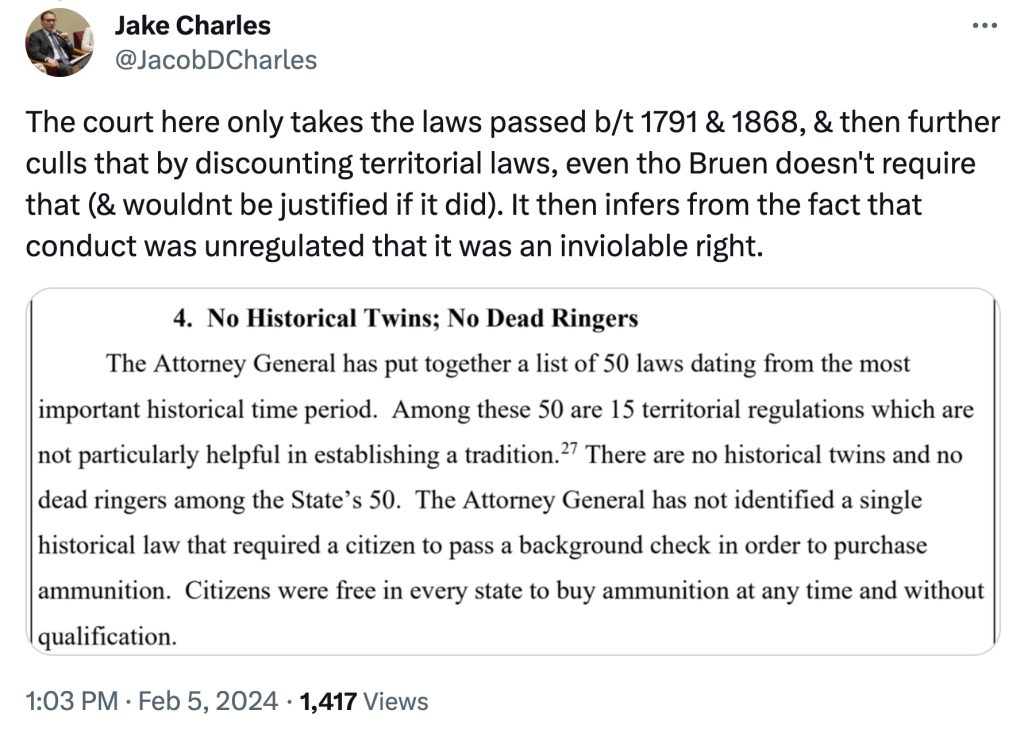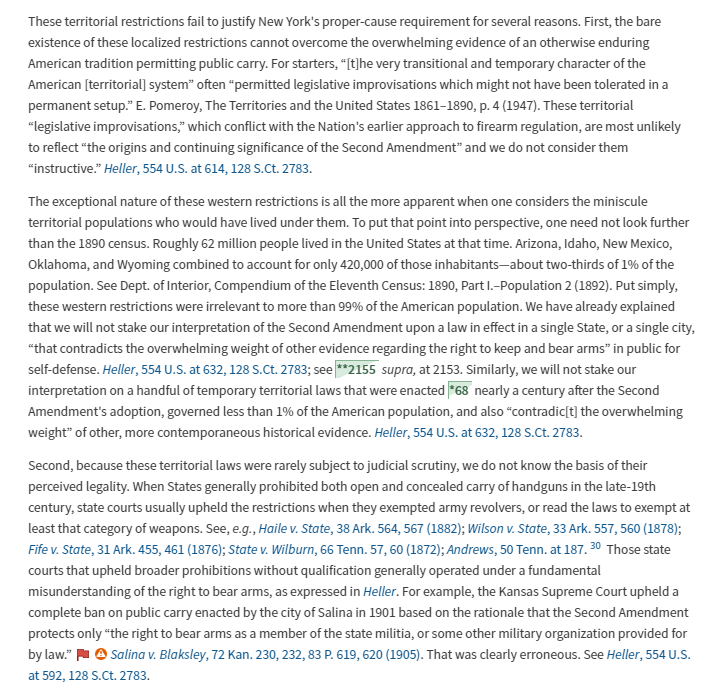
I don’t want to get into a whole kerfuffle with Pepperdine law professor Jake Charles, but the case about which he wrote in a recent tweet string is ours, the California Rifle & Pistol Association’s. You probably know it as Rhode v. Bonta.
For one, the “innovation” in question here is California’s ammunition background check system that forces people to pay money each time they buy ammo. That system wrongly denies over 10% of buyers permission to complete the sale. Of the very few actually prohibited people the system catches, the state of California arrests just 2%.
The real purpose of this “innovation” seems to be harassing law-abiding gun owners, not stopping crime.
Late Sunday, a Ninth Circuit panel stayed the lower court’s injunction against enforcing the law. Still, let’s address some of Professor Charles’ points here about Bruen and Judge Roger Benitez’s ruling in the case . . .

Bruen itself cautions against reliance on pre-founding history, so I don’t see how this is arbitrary.
In a reply to a comment on this, Professor Charles asserts that no true originalist would argue a law from 1786 is less persuasive than one from 1787. I agree, but that’s not what we’re talking about here. Besides, one law that was a declaration of rights for protestants, the newest English law the state presented, was from 1689. I don’t know why anyone would think that’s particularly relevant.

I’m curious what other rights anyone would look at with this framework.
“Well yes but the founders could have restricted religion more if they wanted to!”
Bruen’s analogical analysis is the window the state has to go beyond what came before in order to deal with new challenges and new technologies (ammunition buying is neither).
Yes, it’s a tough standard…as it should be. This is a constitutional right.

It’s totally fine for Prof. Charles to not like and criticize Bruen, but he shouldn’t misrepresent it.

Bruen has a decently long section explaining why territorial laws are of weak persuasive value (screenshotted above). And some of the laws California cited in the case were the same ones Bruen was talking about.

Well, California already banned so-called “ghost guns.” Also, this law didn’t just affect (ban) internet sales. It became a huge hassle every time you bought ammunition at a local California gun store. Again, the system wrongly denied more than 10% of buyers.

As we (rightly) expanded “the People” to include everyone, it only makes sense that historical laws that excluded various demographics from the group “the People” should not be used as historical analogues. The relevant laws, when talking about law-abiding people today, are laws that affected those included in the political community in the past.
There are some exceptions. For example, laws regulating weapon possession by native Americans in the past — who were considered to essentially be foreign nationals — can be analogues for a law, say, banning illegal immigrants from firearms. But that’s pretty limited.
Lastly, Professor Charles omits a repeated point from the Benitez ruling; this case isn’t really about background checks generally. It’s about this background check specifically, and its ridiculous costs, the high number of erroneous denials, and huge limitations on-out-of state purchases.
In his ruling, Judge Benitez hints a couple of times that he would have been fine with the permit-to-purchase system the voters actually enacted with Prop. 63, in which you’d get an ammo-buying card that you have to renew every four years. Benitez brought this up a couple of times at the hearings, even telling the state at one point that if the law were amended back into that form, it would be a very different case.
Any analysis of Benitez’s ruling that leaves out the details of how abusive the ammunition background check system has been is — hopefully — just ignorant of the facts involved, not more maliciously trying to mislead. At least that’s how I choose to view Professor Charles here.
Konstadinos Moros is an Associate Attorney with Michel & Associates, a law firm in Long Beach that regularly represents the California Rifle & Pistol Association (CRPA) in its litigation efforts to restore the Second Amendment in California. You can find him on his Twitter handle @MorosKostas. To donate to CRPA or become a member, visit https://crpa.org/.
This post was adapted by SNW from tweets posted by Konstadinos Moros.

